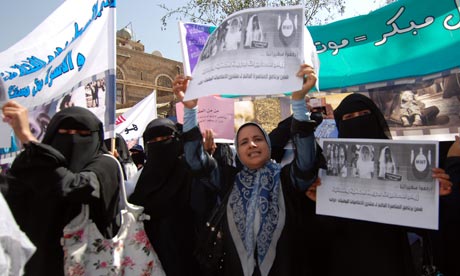Yemen locals claim a girl has died of internal bleeding after marrying a man five times her age, but official denies allegations

Yemeni women attend a
rally in Sana'a in support of proposed legislation banning the marriage
of girls under 17. Photograph: Mohamed Huwais/AFP/Getty Images
An eight-year-old Yemeni girl has died of internal bleeding on
her wedding night after marrying a man five times her age, a social
activist and two local residents said, in a case that has caused an
outcry in the media and revived debate about child brides.
Arwa Othman, head of Yemen's House of Folklore and a leading rights campaigner, said the girl, identified only as Rawan, was married to a 40-year-old late last week in the town of Meedi in Hajjah province, north-western Yemen.
"On the wedding night and after intercourse, she suffered from bleeding and uterine rupture which caused her death," Othman said. "They took her to a clinic but the medics couldn't save her life."
Othman said authorities had not taken any action against the girl's family or her husband.
A security official in the provincial town of Haradh denied any such incident had taken place. He did not want to be identified because he was not authorised to speak to the press.
But two Meedi residents contacted by Reuters confirmed the incident and said tribal chiefs had tried to cover up the incident when the news broke, warning a local journalist against covering the story.
Many poor families in Yemen marry off young daughters to save on the costs of bringing up a child and earn extra money from the dowry given to the girl.
A UN report released in January revealed the extent of the country's poverty, saying that 10.5 million of
Yemen's 24 million people lacked sufficient food supplies, and 13 million had no access to safe water and basic sanitation.
Human Rights Watch (HRW) urged Yemen in December 2011 to ban marriages of girls under 18, warning it deprived child brides of education and harmed their health.
Quoting UN and government data, HRW said nearly 14% of Yemeni girls were married before the age of 15 and 52% before the age of 18. The group said many Yemeni child brides-to-be are kept from school when they reach puberty.
Discussions on the issue were shelved by political turmoil after protests against President Ali Abdullah Saleh in 2011 that led to his ouster.
Several of the 10 countries with the highest rates of child marriage are in west Africa's Sahel and Sahara belt. The practice made headlines in Nigeria in July when lawmakers attempted to scrap a constitutional clause that states citizenship can be renounced by anyone over 18 or a married woman.
Lubabatu Ammani, a statistics director from Zamfara state, north-west Nigeria, said: "The fact is, a lot of people [here], when they hear the campaigning is by people from a different tradition or religion, they won't agree with it."
Source
Arwa Othman, head of Yemen's House of Folklore and a leading rights campaigner, said the girl, identified only as Rawan, was married to a 40-year-old late last week in the town of Meedi in Hajjah province, north-western Yemen.
"On the wedding night and after intercourse, she suffered from bleeding and uterine rupture which caused her death," Othman said. "They took her to a clinic but the medics couldn't save her life."
Othman said authorities had not taken any action against the girl's family or her husband.
A security official in the provincial town of Haradh denied any such incident had taken place. He did not want to be identified because he was not authorised to speak to the press.
But two Meedi residents contacted by Reuters confirmed the incident and said tribal chiefs had tried to cover up the incident when the news broke, warning a local journalist against covering the story.
Many poor families in Yemen marry off young daughters to save on the costs of bringing up a child and earn extra money from the dowry given to the girl.
A UN report released in January revealed the extent of the country's poverty, saying that 10.5 million of
Yemen's 24 million people lacked sufficient food supplies, and 13 million had no access to safe water and basic sanitation.
Human Rights Watch (HRW) urged Yemen in December 2011 to ban marriages of girls under 18, warning it deprived child brides of education and harmed their health.
Quoting UN and government data, HRW said nearly 14% of Yemeni girls were married before the age of 15 and 52% before the age of 18. The group said many Yemeni child brides-to-be are kept from school when they reach puberty.
Discussions on the issue were shelved by political turmoil after protests against President Ali Abdullah Saleh in 2011 that led to his ouster.
Several of the 10 countries with the highest rates of child marriage are in west Africa's Sahel and Sahara belt. The practice made headlines in Nigeria in July when lawmakers attempted to scrap a constitutional clause that states citizenship can be renounced by anyone over 18 or a married woman.
Lubabatu Ammani, a statistics director from Zamfara state, north-west Nigeria, said: "The fact is, a lot of people [here], when they hear the campaigning is by people from a different tradition or religion, they won't agree with it."
Source

No comments:
Post a Comment